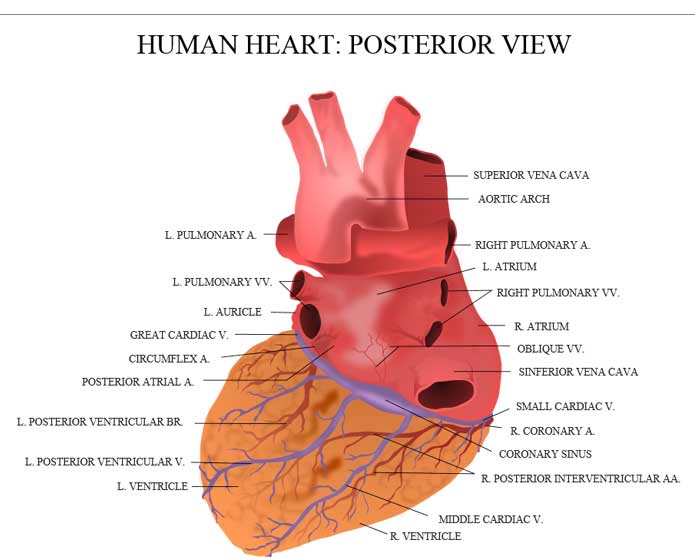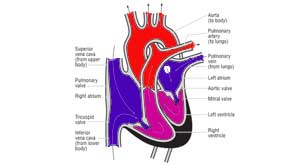
Facts About the Heart for Kids
Posted by Admin / in Science Facts
The heart is an amazing organ in the human body. Over its lifetime it is capable of pumping millions of gallons of blood throughout our body to keep us healthy. Find out more about the heart and the blood that the heart pumps through the body, including red blood cells. Also find out about ways to keep your heart healthy so it can pump blood for a very long time.

The heart has 4 chambers. Red blood is oxygen-rich and is on its way back to the body. Blue blood needs new oxygen from the lungs.
Heart and Blood Facts for Kids
- The heart is a very important organ in the human body. The heart is part of the circulatory system.
- The size of the heart is about the size of a person's fist
- The heart's job is to pump blood through the body. The old blood, which the body used the oxygen returns to the heart where oxygen is replaced in the blood. The blood contains nutrients and blood cells our body needs and waste our body need to remove.
- Blood travels to the heart in our veins. Blood travels away from our heart in arteries.
- The blood entering the heart is purplish-blue. Can you see the blue veins in your body? This blood does not have oxygen.
- Blood exiting the heart is red. It contains a full supply of oxygen.
- The heart has 4 compartments. There are two atrium on top and two ventricles on the bottom. The atrium are filled with blue blood returning from the body and lungs. The ventricles are filled with red blood ready for the heart to pump back to the body and lungs.
- The heart is basically 2 muscles. One that pumps blue blood from the body and one that pumps red blood to the body.
- To control the flow of blood the heart uses a series of valves. The heart valves keep the blood in the right place. Many people who have heart problems actually have problems with the valves in their heart.
- Surprisingly, the heart beats over 100,000 times per day!
- If you were to live to an age of 80, your heart will have pumped 50 million gallons of blood. It's no wonder we need to take care of our heart. Try finding a pump that reliable
- The cells that make up blood constantly are regenerated. This is why people are able to donate blood to help others.
- In a healthy body, bone marrow produces approximately 3,000,000 new red blood cells every second.
- A new blood cell has a life of about 4 months. During this time the blood cell will travel about 250,000 feet or 47.3 miles (76.1 kilometers)!
- Blood pressure in the heart is capable of squirting blood over 30 feet in the air (just under 10 meters in the air).
- A person has an incredible amount of blood vessels in their body. If the blood vessels from one person's body were stretched out in a row, the length would equal 60,000 miles! (96,560 kilometers!)
- The average adult has about 10.5 pints (4.7 liters) of blood in their body.
- If your doctor says it OK, you should exercise at least 60 minutes a day to keep a healthy heart. Exercise includes many things like walking, running, jumping, climbing, swimming, some sports and more.
- You can help your heart by not eating foods with a fat called saturated fat. Doctor's consider this bad fat because it can begin to clog up your arteries, veins and even your heart valves.
- Eating a diet that includes plenty of fruits and vegetables (sorry french fries so not count). Each meal should contain at least one fruit or vegetable.
- Limit the amount of sugar you eat and drink. Pop and juices have a high amount of sugar which can lead to heart issues.
- If you are not allergic (check with your parents and doctor) eat some nuts and fish (like salmon, not fried fish). These food have omega-3 fatty acids which is very good for your heart.
- Stay active. If you need to sit for a long time to do homework or relaxing, be sure to get up to move around to keep good blood circulation.
- Keep regular doctor visits and tell the doctor if you are having any problems. For example, if you are having a hard time walking up stairs without breathing hard, this would be a good thing to talk to your doctor about.
